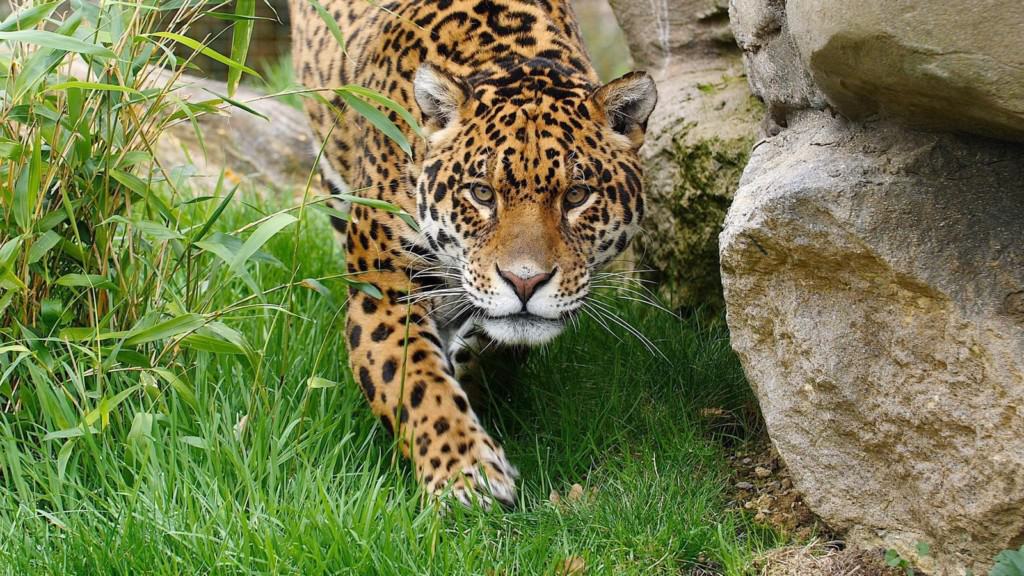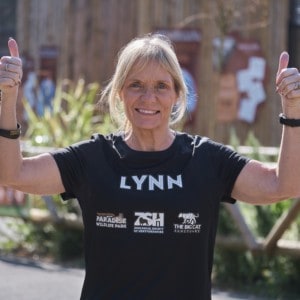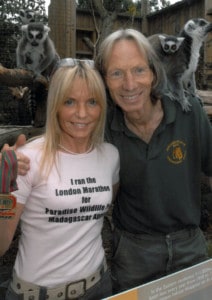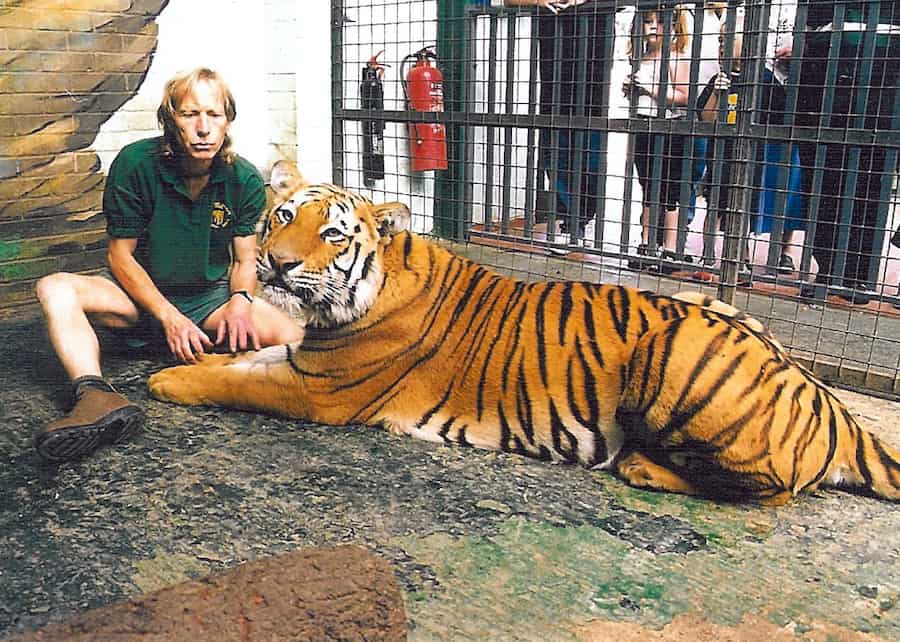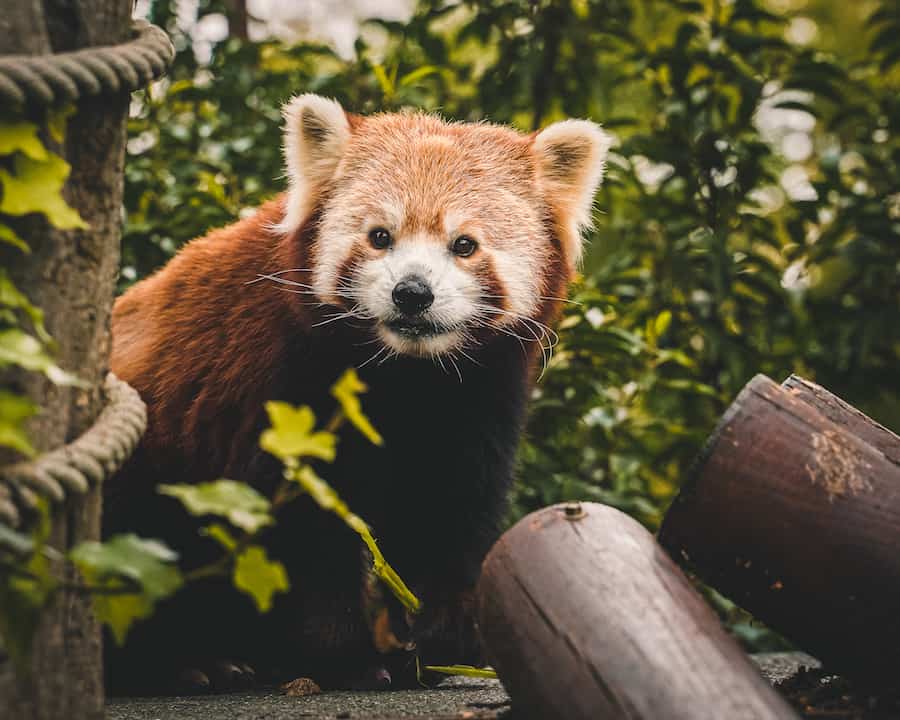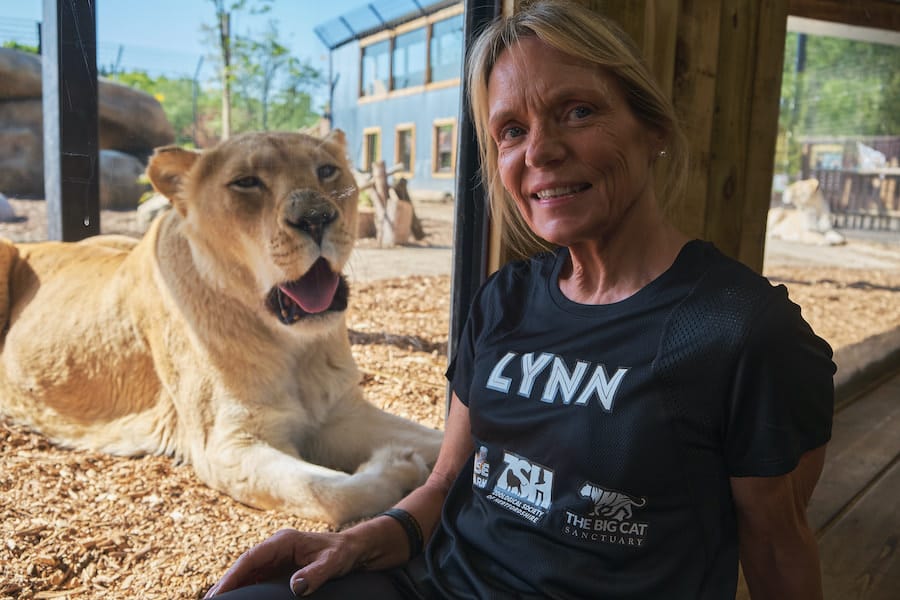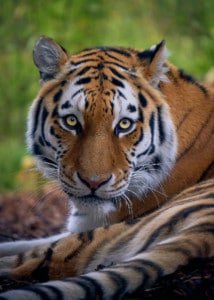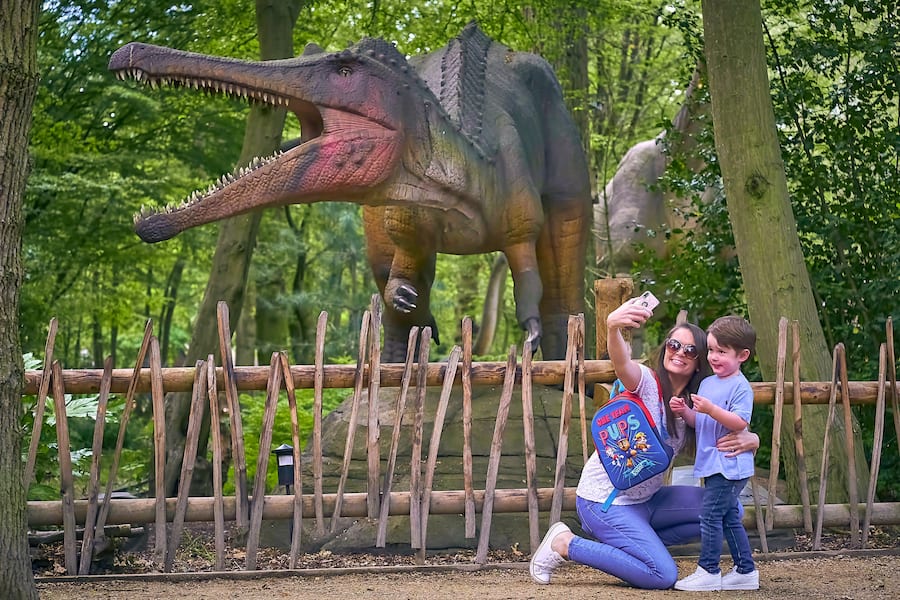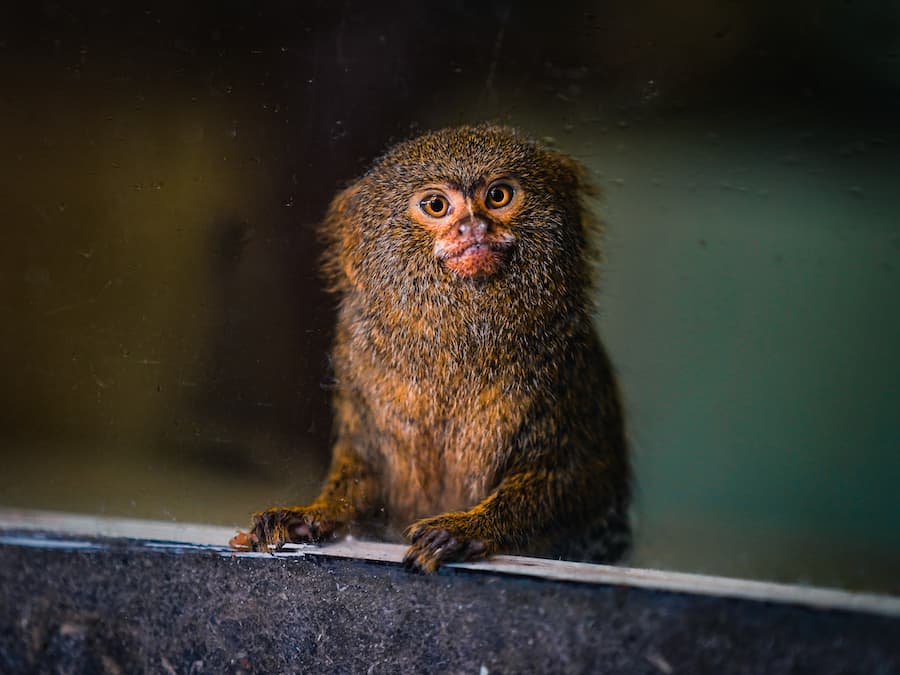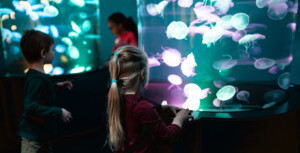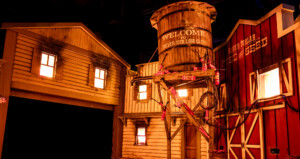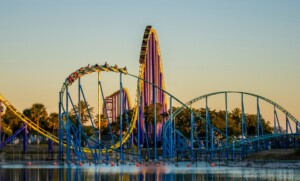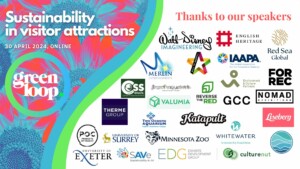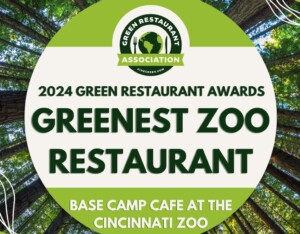Paradise Wildlife Park’s new Land of the Tigers Amur tiger habitat opened on 3 October 2020. Featuring a fish-pool deep enough for the tigers to be fully submerged underwater and a new viewing area, the bespoke exhibit is currently home to Siberia and Aleena, two female tigers.
Paradise Wildlife Park is a family business, having been purchased by the Sampson family in 1984. At the time, the Sampsons ran a coach and bus company and were looking for land to park the coaches.
Peter Sampson paid £100,000 for the dilapidated Broxbourne Zoo, complete with a handful of animals in poor condition. To begin with, he had no intention of transforming it into one of the best wildlife parks in the UK. Nevertheless, that is what happened.
Almost 37 years on, his daughter Lynn Whitnall is CEO of Paradise Wildlife Park Ltd, Director of Zoological Society of Hertfordshire, and Trustee of The Big Cat Sanctuary.
“At first,” she says, “The idea was that we would keep a few animals, and bring in school groups with the coaches. There was a possibility, too, of building at a restaurant a bit like a Caesar’s Palace. Somewhere people could come for entertainment and dinner, using the coaches. That was one of the reasons they bought it.”
One of the animals remaining on the site was a lion called Bobby, living in a cramped converted bird enclosure. Having met the lion and the other animals, Sampson vowed to improve their lives. From that point, the coaches were destined to take second place, and Bobby became a star.
The early days of Paradise Wildlife Park
Lynn Whitnall, having grown up in her parents’ bus and coach business and travel agencies, studied travel and tourism, went to work in London, and then for Tottenham Hotspur Football Club, organising their European travel.
Six months after her family bought the park, she returned to help tidy it up, on a temporary basis:
“It was a mixture of a tip and a building site. The previous owner had run out of money. So he had turned it into a tip, where people would pay to get rid of their rubbish. It took us about six months just to clear all the rubbish, get it looking relatively nice, and to bring the animals back to health.”
There was a small café on the site:
“We had built it into a restaurant,” she says, “I took over its running at this point, and did catering for functions and weddings. We also did children’s parties and food for the people coming here for experiences and days out. 36 years later, I’m still here.”
Protecting endangered species
Whitnall, as CEO, now looks after Paradise Wildlife Park, the Zoological Society of Hertfordshire, as well as the Big Cat Sanctuary in Kent, a later addition.
Explaining its acquisition, she says:
“20 years ago, we bought Marley Farm, Smarden, the site of the Big Cat Foundation in Kent, operated at the time by the Born Free Foundation.”
Paradise established the Wildlife Heritage Foundation, financially supported by the Park, to support conservation both on-site and at a distance, participating in breeding programmes of endangered species.
During 2002 the Born Free Foundation and the Wildlife Heritage Foundation operated the site together:
“Born Free were there to start with, with Malcolm Dudding, who owned the farm. We were the only zoo to have a Dangerous Wild Animal licence, along with Born free; they had their tigers there. Over a period of a couple of years, we took over completely and bought it.
“It’s now the Big Cat Sanctuary in Kent. It is not open to the public, but we do experiences there: shadow a big cat keeper; feed the cats. We have seven absolutely beautiful luxury lodges where we do an overnight experience, and we do open days, usually five a year, though next year it will be ten, as we plan to transfer the ones from this year. We also have Members’ Days and Adopters’ Days.”
Transforming Paradise Wildlife Park
The 37 year period has seen an incredible transformation. “That’s down to the family’s blood, sweat and tears, the teamwork, and to all the supporters and volunteers,” says Whitnall.
A sweet-natured tiger called Rocky was, after Bobby the Lion, the emotional point of connection for the public. Born in a travelling circus in Ireland, he was rejected by his mother. Rocky was then rescued by Peter Sampson, who flew to Ireland in a biplane and brought the tiger cub back on his lap, at just weeks old.
Hand-reared by Sampson, his wife and children, Rocky died in 2019 at nearly 20 years old.
The choice to call the park a wildlife park rather than a zoo was a pragmatic response to the fact that in the 1980s, some zoos, including Broxbourne, notorious as the worst zoo in the country, had a poor reputation:
“We’re in the middle of beautiful woods, and the roads in front are all Paradise Lane, or Paradise whatever. So we called ourselves Paradise Park.”
Around 20 years ago, Whitnall started the volunteer-run charity, Friends of Paradise Park. Four years ago, the business was changed around so that The Zoological Society of Hertfordshire (ZSH) is now Paradise Wildlife Park’s registered charity (no.1108609), raising funds to support wildlife conservation projects both in the UK and around the globe.
Conservation and animal welfare
Conservation, welfare, breeding and education are the lynchpins of Paradise Wildlife Park and The Big Cat Sanctuary. Over the years, the wildlife park has worked tirelessly to support African species and conservation, including the Lemur and Madagascan EAZA appeals, Cheetah and Rhino Conservation, Lion Collaring for Ol Pejeta, and sending African Lions back to Uganda.
The Drive4Wildlife conservation initiative saw four members of the Paradise team driving across Kenya, Tanzania, Rwanda and Uganda, delivering equipment and funds to extraordinary wildlife charities and culminating in the delivery and fitting out of a specialist vehicle to be used by the Ugandan Wildlife Education Centre to rescue injured animals and help assist anti-poaching patrols.
“Because of the work my boys have done in conservation with Drive4Wildlife,” Whitnall says, “We started Dine for Wildlife. The Dine for Wildlife Summer Ball was our big event of 2019.”
There are also a number of breeding programmes in progress:
“We have the Amur tigers, for a start; our Snow Leopards, the cheetahs, Pallas Cats, gibbons, tapirs, African Penguins; those are just a few. Our red pandas have done exceptionally well, as have the snow leopards. We’ve been very lucky.
“Some of those go off to other institutions in the UK and Europe; we have sent one to America and one to Japan as part of the breeding programmes and, in the future, possible reintroduction programmes.”
Raising vital funds
Fundraising for conservation and for the day-to-day running expenses has had to be a focus over the decades. It costs around £20,000 a day to keep the park running, Whitnall explains. This includes VAT and staff salaries as well as animal care.
She says:
“The lesson I learned came, first of all, from my parents. They always said ‘Don’t buy it unless you have the money.’
“The second lesson came when, although we didn’t have it on site, we closed for six weeks during the Foot and Mouth crisis. That taught us the importance of always having reserves of more than six weeks. We have been very frugal in the ways we have spent our money.”
Expanding on this, she explains:
“For us to build an enclosure here at Paradise Wildlife Park, we’re looking around a million, where for a lot of other places it could be 5-10 million or more. At the Big Cat Sanctuary, we probably don’t even spend that. The way we build there is slightly different, and they still look beautiful.”
For the moment, Whitnall has a ‘less is more’ ethos, where simplicity and a clarity of vision pays off:
“It’s about having fewer animals, more space for them, and a more natural environment. Where an animal has passed away through old age, we might perhaps not rush to fill that habitat. We’re thinking of the future.”
Paradise Wildlife Park and COVID-19
The COVID-19 pandemic has made the last year difficult.
“It has been surreal,” she says. “We have stayed exceptionally positive all through it, especially for our team and volunteers. But it has been something of a rollercoaster. Thank God for the furlough scheme.”
While Whitnall and her team were not eligible for various COVID-relief business grants as the rateable value of the two parks is too high, Paradise’s social media and digital marketing strategy has been phenomenally successful in terms of customer engagement, and reaching new audiences.
“We have been doing a lot of live-streaming from both parks. That has kept people engaged, and we’ve been able to do raffles and auctions online. We have an Amazon wish-list with items for animal enrichment, blankets, and that sort of thing. Plus, especially here at Paradise, we have our members and supporters and local companies who donate fresh vegetables and food for the animals.
“It’s been beautiful. There have been tiny children with their little bags of fruit from the supermarket, and companies delivering donations of fruit, vegetables and meat. And that has been keeping us going.
“We even have some of our neighbours, bless their hearts, who live opposite the park, and who have been bringing up boxes of food every two or three weeks for us to share out for the keepers. It has been so nice.”
A family business
Whitnall herself has kept in touch with all the staff and volunteers by doing e-news every Friday:
“It could be a recipe for a cocktail or mixing a cake, or keeping them up to date with news about the animals, with plans, and keeping it positive. We may have been closed for a while, but we’ll be open in a few weeks. So we need to be prepared. We have to keep sweeping the leaves, and cleaning the toilets.”
The success of Paradise Wildlife Park is a testament to compassion, hard work, a willingness to learn, business acumen and a strong family business ethos.
Whitnall’s sons, Aaron, Tyler and Cameron, have grown up at the park. They even shared their home with a lion cub, Zara, for the first five months of her life. Now, they work predominantly in marketing, social media and broadcasting for the parks.
“They have worked across the animal park over the years, done the experiences and tours. And they still do events and functions, representing us at conferences, often travelling abroad. They have also done a lot in conservation.
“They have such a good understanding of future planning, and design. When it comes to projects like the Amur Tiger habitat, they have great support from both the keepers and from others in the industry.”
A close-knit community
The zoo community is, she feels, a close and friendly one:
“For instance, next year we plan to bring in sun bears – which will be part of a breeding programme -and binturongs. The coordinator for that is at Colchester Zoo. All the time, you’re learning: there’s no point in re-inventing the wheel. All the zoos collaborate, and work together.”
Over the last five years, the park has seen additions and improvements in areas from the educational World of Dinosaurs, the African Penguins and the Amazon building, which has the largest anaconda on show in the UK, to the Lion Pride Lands, home to their small pride of four white lions.
Land of the Tigers at Paradise Wildlife Park
The new Land of the Tigers Amur tiger habitat, which opened on 3 October 3 2020, has a pool in which the tigers can, if they choose, submerge themselves.
“Hopefully, when they settle and get used to it properly, we’ll be able to see the tigers swimming, says Whitnall. “We’ve got fish in there, and at the moment the tigers are scared of the fish, rather than the other way around.
“The fish are so beautiful. I’m really happy we put the carp and so on in there. It’s a real wow factor, for all ages. It’s even better than we expected, which is fantastic.”
The pool has been designed and built to take the weight of two tigers:
“There is a shelf at the back, so they can lie in the water and bask; there’s a little waterfall, and they can drink out of the pool. We should have opened at Easter but waited until October because of the lockdown. It was the first time we’ve opened anything in winter. When the water warms up a bit, we hope they’ll start having a bit of a play around in there, which will be wonderful.”
The enclosure, she explains, is stunning:
“We’ve recycled containers; recycled glass; we’ve been able to keep most of our foliage. It’s been a really lovely way of creating a new habitat. Each time we do one, we learn, and I’m really proud of it. I’m just really excited now for the jaguars and the sun bear habitats, which will come next.”
Keeping the animals comfortable
Most of the animals have been born in the UK, and are used to the climate. Nevertheless, Whitnall says:
“We do look after them all as if they’re our pets. They have extra bedding when it’s cold, and heat-lamps, or, for tortoises, UVB lamps for their shells. In the summer, when it’s hot, animals such as the snow leopards have cool air and sprinklers. Also, we give them ice pops with fruit or meat in them. There are lots of things the keepers can do to make sure the animals are comfortable.”
Future plans
The ten-year strategy for the two parks involves a new substation for electricity at the Big Cat sanctuary:
“Although from Paradise Wildlife Park you can see central London from the front gate, and in Kent, you’re between Ashford and Maidstone, neither park is on mains water, sewerage or electric. It has been a bit of a nightmare, over the years, to keep everything going. You’d flush a toilet, and the coffee machine would go off.
“So we’re now putting the substation in and a new sewage treatment plant. All the infrastructure that people don’t really see.”
Another innovation at the Big Cat Sanctuary is the just-completed jaguar breeding centre:
“Our patron, HRH Princess Eugenie opened it for us. We’re just finishing an extension to the tiger breeding centre. And we have plans to build seven small cat enclosures, for our Rusty Spotted Cats, Pallas Cats, and Servals. We’re building an Animal Resource Centre and Ark, like the Keeper HQ at Paradise. That has the feed rooms, fridge and freezers, the vet rooms, and the offices.
“At Paradise, not only are we looking at the new habitats for 2021 but for 2022 we’re looking at our retail and our play areas.
“There’s a lot going on.”
Images kind courtesy of Paradise Wildlife Park
